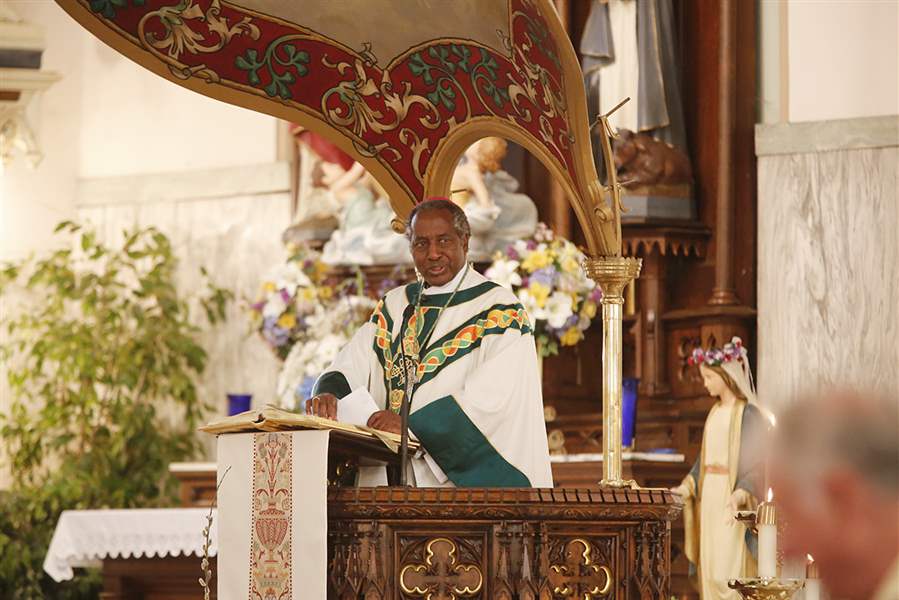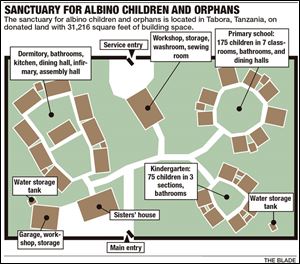
ARCHBISHOP’S TOLEDO VISIT
Tanzanian cleric makes pleas for children’s safety
Hunters preying on albino youths throughout East African nation
5/26/2014
Archbishop Paul Ruzoka, of Tabora, Tanzania, led several Masses during his visit to Toledo, including a Blue Mass Historic Church of Saint Patrick.
THE BLADE/JETTA FRASER
Buy This Image

Archbishop Paul Ruzoka, of Tabora, Tanzania, led several Masses during his visit to Toledo, including a Blue Mass Historic Church of Saint Patrick.
“They move stealthily at night, like a lion hunting in the jungle; great beasts that pull children from their huts and devour them.”
That’s how Archbishop Paul Ruzoka of Tabora, Tanzania, describes the human bounty hunters who prey on the albino children of this East African country.
The archbishop has been visiting Lucas County for the last two weeks to raise awareness of the violence committed against albino children in Tabora and surrounding communities.
During his visit, the archbishop has met with religious and community leaders and has led several Masses, including the fifth annual Blue Mass honoring law enforcement at the Historic Church of St. Patrick in Toledo on May 18.
His visit also is intended to help Toledo residents Don and Gisela Stiles raise funds to continue building a school campus — The Sanctuary of Cheyo — where albino children can live and learn in safety.

Cheyo is located just outside of Tabora. The nonprofit Universal Initiative Foundation, which was founded by the Stileses, has become a collaborative effort with Archbishop Ruzoka.
Since 2007, more than 290 documented cases have been reported of albino children being brutally attacked, their various body parts hacked off and sold to witch doctors in Tanzania and other parts of Africa, the archbishop said. The actual count is believed to be much higher.
Witch doctors use the body parts to make potions that they claim possess magical powers capable of boosting libido and bringing riches, he said.
“They are using the ignorance of people to enrich themselves,” Archbishop Ruzoka said. “It’s devilish.”
Nine years ago, Don Stiles met the archbishop on a flight from Iraq to London. The two men became quick friends and, by January, 2012, Don and Gisela Stiles, who farmed in Colorado, “retired” and moved to Tanzania.
Initially, the archbishop asked the couple to help raise funds to build a university in Tanzania.
After several bouts with malaria, the Stileses were forced to relocate, settling in Toledo. They joined St. Patrick of Heatherdowns and converted to Catholicism.
The couple stayed in touch with Archbishop Ruzoka, who told them about the plight of albinos in Tanzania.
That prompted the Stileses to create the Universal Initiative Foundation to raise money to build a sanctuary for the children. They donated the first $16,000 and have been raising funds since.
The parish of Cheyo donated 5 acres of land for the project.
One small building that houses a few albino children and a group of Italian nuns has been built, Mrs. Stiles said.
The goal is to raise $500,000 for the first phase of the facility, which will include the first student dormitories, classrooms, and cafeteria.
The first dorms would house 60 people, Mr. Stiles said.
The goal is to house 600 students. When completed, the facility would be encased by 12-foot-high brick walls, and a small army of guards would protect the children from poachers.

“Our dream is that someday we’ll have a mix of students there, living and studying together,” Mr. Stiles said.
But an integrated society seems far away right now.
According to census information, about 250,000 albino people live in Tanzania. One in about every 2,000 children born in Tanzania is born with the genetic anomaly that affects the pigment in the skin, hair, and eyes, according to Mr. and Mrs. Stiles. It’s a regional phenomenon that is still being studied.
In the West, one in every 20,000 children is born albino, Mrs. Stiles said.
“Growing up in the 1960s, we had albinos in our communities,” Archbishop Ruzoka, 66, said. “Everyone was respected; families grew up next to each other.”
The problems began less than a decade ago, the archbishop said. He says it coincides with the discovery that their region of Lake Victoria is one of the world’s richest spots for commercial fishing and for mining precious metals.
As the fishing and mining industries flourished, so did the myths that albino children’s body parts made for good-luck potions.
More recently, people have started to believe that having sex with an albino woman or girl can cure HIV/AIDS, which is resulting in numerous rapes, he said.
At the same time, there’s been an effort to dehumanize albinos. People try to characterize albinos as dumb and ignorant and aberrations of God, Archbishop Ruzoka said.
Albinos are denied jobs; They aren’t allowed to work in restaurants, because it’s widely believed that an albino’s touch can poison food, he said. Because albinos often have poor eyesight, teachers label them as “stupid” and make them sit in the back of classrooms.
The church and government have tried to fight back.
An albino schoolteacher was appointed to the nation’s parliament to show people that albinos are smart, educated, and contributing citizens, the archbishop said.
Efforts are ongoing to attempt to debunk myths.
“We’re setting up the center to protect the children and to try and educate them so that they can become self-reliant, and this can help remove that stigma. It’s a very big stigma,” Archbishop Ruzoka said.
“We need to pray to God to help us build up these children, these people’s personal dignity. But we can’t just talk about it. We need to do something about it. We do this by raising awareness and trying to raise funds to carry out this mission.”
For more information, go to universalif.org.
Contact Federico Martinez at: fmartinez@theblade.com or 419-724-6154.